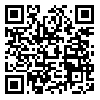Volume 13, Issue 2 (9-2021)
2021, 13(2): 24-30 |
Back to browse issues page
Ethics code: IR.NKUMS.REC.1399.076
Download citation:
BibTeX | RIS | EndNote | Medlars | ProCite | Reference Manager | RefWorks
Send citation to:



BibTeX | RIS | EndNote | Medlars | ProCite | Reference Manager | RefWorks
Send citation to:
AleSheikh P, Shahinfar F, Soltani S, Zarghami Moghaddam P. Evaluation of Antimicrobial Effects of Different Ziziphus jujuba Extracts on Oral Pathogens. North Khorasan University of Medical Sciences 2021; 13 (2) :24-30
URL: http://journal.nkums.ac.ir/article-1-2354-en.html
URL: http://journal.nkums.ac.ir/article-1-2354-en.html
1- Ph.D. of Chinese Medicine, Natural Products and Medicinal Plants Research Center, North Khorasan University of Medical Sciences, Bojnurd, Iran
2- Dentist, Faculty of Dentistry, North Khorasan University of Medical Sciences, Bojnurd, Iran ,fatemehshahinfarr@gmail.com
3- Assistant Professor, Department of Prosthesis, Faculty of Dentistry, North Khorasan University of Medical Sciences, Bojnurd, Iran
4- Ph.D. of Microbiology, Natural Products and Medicinal Plants Research Center, North Khorasan University of Medical Sciences, Bojnurd, Iran
2- Dentist, Faculty of Dentistry, North Khorasan University of Medical Sciences, Bojnurd, Iran ,
3- Assistant Professor, Department of Prosthesis, Faculty of Dentistry, North Khorasan University of Medical Sciences, Bojnurd, Iran
4- Ph.D. of Microbiology, Natural Products and Medicinal Plants Research Center, North Khorasan University of Medical Sciences, Bojnurd, Iran
Abstract: (3881 Views)
Introduction: The interest in ziziphus jujube is growing in the world because it is an excellent source of nutrients and chemicals and has traditionally been used as an anticoagulant, sedative, anticancer, antifungal, anti-diabetic, anti-bacterial, antispasmodic, and Antioxidants are used. Therefore, the purpose of this study is to select the best extract with the highest antimicrobial effect for extracting the ziziphus jujube, to produce medicinal products of plant origin with maximum effectiveness and minimal side effects.
Methods: Ethanolic, methanolic, aqueous and dichloromethane extracts of ziziphus jujube were prepared by maceration method, and in order to evaluate the antimicrobial effect of the extracts, we used Agar Disk Test and Agar well Test method. In order to obtain the minimum inhibitory concentration and the minimum lethal concentration, 96 well microplates were used to obtain effective concentrations for the removal and inhibition of the desired microorganisms in different extracts.
Results: Analysis of Agar Disk Test and Agar well Test methods data showed that the tested extracts had no significant effect on the tested bacteria / fungi and no growth inhibition zone was observed around the disk and wells. The results of (MIC / MBC / MFC) indicated that (100 mg / mL) concentration of all aqueous, ethanolic, methanolic and dichloromethane extracts had no effects on the Streptococcus mutans and Candida albicans and we need higher concentrations.
Conclusions: Aqueous, ethanolic, methanolic and dichloromethane extracts of jujube fruit did not show significant antibacterial and antifungal effects compared to positive control (chlorhexidine and nystatin, amoxicillin).
Methods: Ethanolic, methanolic, aqueous and dichloromethane extracts of ziziphus jujube were prepared by maceration method, and in order to evaluate the antimicrobial effect of the extracts, we used Agar Disk Test and Agar well Test method. In order to obtain the minimum inhibitory concentration and the minimum lethal concentration, 96 well microplates were used to obtain effective concentrations for the removal and inhibition of the desired microorganisms in different extracts.
Results: Analysis of Agar Disk Test and Agar well Test methods data showed that the tested extracts had no significant effect on the tested bacteria / fungi and no growth inhibition zone was observed around the disk and wells. The results of (MIC / MBC / MFC) indicated that (100 mg / mL) concentration of all aqueous, ethanolic, methanolic and dichloromethane extracts had no effects on the Streptococcus mutans and Candida albicans and we need higher concentrations.
Conclusions: Aqueous, ethanolic, methanolic and dichloromethane extracts of jujube fruit did not show significant antibacterial and antifungal effects compared to positive control (chlorhexidine and nystatin, amoxicillin).
Keywords: Ziziphus jujube, Streptococcus mutans, Candida albicans, Oral Pathogens, Antimicrobial Effect
Type of Study: Orginal Research |
Subject:
Basic Sciences
Received: 2021/03/3 | Accepted: 2021/04/5 | Published: 2021/09/14
Received: 2021/03/3 | Accepted: 2021/04/5 | Published: 2021/09/14
Send email to the article author
| Rights and permissions | |
 |
This work is licensed under a Creative Commons Attribution-NonCommercial 4.0 International License. |







